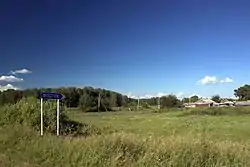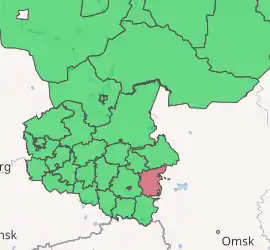Abatsky District
Abatsky District (Russian: Аба́тский райо́н) is an administrative district (raion), one of the twenty-two in Tyumen Oblast, Russia.[1] As a municipal division, it is incorporated as Abatsky Municipal District.[6] It is located in the southeast of the oblast. The area of the district is 4,080 square kilometers (1,580 sq mi).[3] Its administrative center is the rural locality (a selo) of Abatskoye.[2] Population: 19,837 (2010 Census);[4] 23,566 (2002 Census);[8] 26,453 (1989 Census).[9] The population of Abatskoye accounts for 40.1% of the district's total population.[4]
Abatsky District
Абатский район | |
|---|---|
 Village of Vostok, Abatsky District | |
.png.webp) Flag | |

Location of Abatsky District in Tyumen Oblast | |
| Coordinates: 56°17′N 70°27′E | |
| Country | Russia |
| Federal subject | Tyumen Oblast[1] |
| Established | 12 November 1923 |
| Administrative center | Abatskoye[2] |
| Area | |
| • Total | 4,080 km2 (1,580 sq mi) |
| Population | |
| • Total | 19,837 |
| • Estimate (2018)[5] | 17,071 (−13.9%) |
| • Density | 4.9/km2 (13/sq mi) |
| • Urban | 0% |
| • Rural | 100% |
| Administrative structure | |
| • Administrative divisions | 11 Rural okrugs |
| • Inhabited localities[1] | 65 Rural localities |
| Municipal structure | |
| • Municipally incorporated as | Abatsky Municipal District[6] |
| • Municipal divisions[6] | 0 Urban settlements, 11 Rural settlements |
| Time zone | UTC+5 (MSK+2 |
| OKTMO ID | 71603000 |
| Website | https://abatsk.admtyumen.ru/mo/Abatsk/index.htm |
Geography
Abatsky District is located in the southeast of Tyumen Oblast, supporting mostly agricultural land on forest-steppe terrain of the West Siberian Plain.[3] The district is in the Ural Federal District, on the west side of the border with the Siberian Federal District. The Ishim River runs from south to north through the middle of the district, about 130 km south of where it enters the Irtysh River to the north. The Trans-Siberian Railway runs through the middle of the district from west to east, passing through the administrative center of Abatskoye. Abatsky District is 280 km southeast of the city of Tyumen, 185 km northwest of the city of Omsk, and 2,000 km east of Moscow. The area measures 70 km (north-south), 60 km (west-east); total area is 4,080 km2 (about 0.003% of Tyumen Oblast).[3]
The district is bordered on the north by Vikulovsky District, on the east by Krutinsky District of Omsk Oblast, on the south by Sladkovsky District, and on the west by Ishimsky District.
History
The first Russian presence was as part of a string of security posts along the Ishim River in the 1600s, as a defense against Siberian Tatars. The settlement of Abatskoye is believed to have been formed in 1695. By 1710, the population in 9 villages was reported as 177 households (473 male, 402 female individuals). Incoming settlers from central Russia were attracted to the farmland, and with involuntary conscripts added the population grew. By the 1800s, Abatskoye had become a significant crossroads market town.[10]
The district was formally created November 12, 1923 as part of the Ishim district of the Ural region. On January 1,1932, the District abolished, and became part of Maslyansky District. On January 25,1935, the District was formed again as part of Omsk Oblast, and on August 14, 1944 by decree of the USSR Supreme Soviet Presidium, Abatsky District was included in Tyumen Oblast
References
Notes
- Law #53
- Государственный комитет Российской Федерации по статистике. Комитет Российской Федерации по стандартизации, метрологии и сертификации. №ОК 019-95 1 января 1997 г. «Общероссийский классификатор объектов административно-территориального деления. Код 71 203», в ред. изменения №278/2015 от 1 января 2016 г.. (State Statistics Committee of the Russian Federation. Committee of the Russian Federation on Standardization, Metrology, and Certification. #OK 019-95 January 1, 1997 Russian Classification of Objects of Administrative Division (OKATO). Code 71 203, as amended by the Amendment #278/2015 of January 1, 2016. ).
- "General Information" (in Russian). Abatsky District. Retrieved January 20, 2017.
- Russian Federal State Statistics Service (2011). "Всероссийская перепись населения 2010 года. Том 1" [2010 All-Russian Population Census, vol. 1]. Всероссийская перепись населения 2010 года [2010 All-Russia Population Census] (in Russian). Federal State Statistics Service.
- "26. Численность постоянного населения Российской Федерации по муниципальным образованиям на 1 января 2018 года". Federal State Statistics Service. Retrieved January 23, 2019.
- Law #263
- "Об исчислении времени". Официальный интернет-портал правовой информации (in Russian). June 3, 2011. Retrieved January 19, 2019.
- Russian Federal State Statistics Service (May 21, 2004). "Численность населения России, субъектов Российской Федерации в составе федеральных округов, районов, городских поселений, сельских населённых пунктов – районных центров и сельских населённых пунктов с населением 3 тысячи и более человек" [Population of Russia, Its Federal Districts, Federal Subjects, Districts, Urban Localities, Rural Localities—Administrative Centers, and Rural Localities with Population of Over 3,000] (XLS). Всероссийская перепись населения 2002 года [All-Russia Population Census of 2002] (in Russian).
- "Всесоюзная перепись населения 1989 г. Численность наличного населения союзных и автономных республик, автономных областей и округов, краёв, областей, районов, городских поселений и сёл-райцентров" [All Union Population Census of 1989: Present Population of Union and Autonomous Republics, Autonomous Oblasts and Okrugs, Krais, Oblasts, Districts, Urban Settlements, and Villages Serving as District Administrative Centers]. Всесоюзная перепись населения 1989 года [All-Union Population Census of 1989] (in Russian). Институт демографии Национального исследовательского университета: Высшая школа экономики [Institute of Demography at the National Research University: Higher School of Economics]. 1989 – via Demoscope Weekly.
- "History of the Region". Abatsky District (official web site). Abatsky District. Retrieved March 3, 2017.
Sources
- Тюменская областная Дума. Закон №53 от 4 ноября 1996 г. «Об административно-территориальном устройстве Тюменской области», в ред. Закона №47 от 7 мая 2015 г. «О внесении изменений в статьи 14 и 15 Закона Тюменской области "Об административно-территориальном устройстве Тюменской области"». Вступил в силу с момента официального опубликования. Опубликован: "Тюменские известия", №220, 12 ноября 1996 г. (Tyumen Oblast Duma. Law #53 of November 4, 1996 On the Administrative-Territorial Structure of Tyumen Oblast, as amended by the Law #47 of May 7, 2015 On Amending Articles 14 and 15 of the Law of Tyumen Oblast "On the Administrative-Territorial Structure of Tyumen Oblast". Effective as of the moment of official publication.).
- Тюменская областная Дума. Закон №263 от 5 ноября 2004 г. «Об установлении границ муниципальных образований Тюменской области и наделении их статусом муниципального района, городского округа и сельского поселения», в ред. Закона №39 от 7 мая 2015 г. «Об упразднении деревни Бурмистрова Балаганского сельского поселения Викуловского муниципального района Тюменской области и внесении изменений в отдельные Законы Тюменской области». Вступил в силу 1 января 2005 г. Опубликован: "Тюменская область сегодня", №213 (без приложений), 12 ноября 2004 г. (Tyumen Oblast Duma. Law #263 of November 5, 2004 On Establishing the Borders of the Municipal Formations of Tyumen Oblast and on Granting Them the Status of a Municipal District, Urban Okrug, and Rural Settlement, as amended by the Law #39 of May 7, 2015 On Abolishing the Village of Burmistrova in Balaganskoye Rural Settlement of Vikulovsky Municipal District of Tyumen Oblast and on Amending Various Laws of Tyumen Oblast. Effective as of January 1, 2005.).